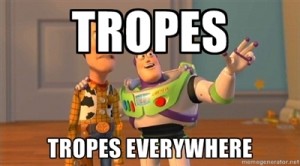It’s no secret that QUILTBAG+ characters in fiction have been widely misrepresented. And it’s no secret that it’s a big issue that needs solving. Personally, I think speculative fiction is the perfect battleground for that fight. In speculative fiction, we craft worlds from the ground up. Worlds, characters, cultures—more than any other genre, sci-fi and fantasy give the writer complete control over every aspect of their fictional playground. Not to mention we have a history of QUILTBAG+ representation to bring to play, and a history of tackling society’s issues in our fiction. Star Trek: The Next Generation comes to mind. There’s an episode where a race of aliens have ‘evolved beyond gender.’ If somebody shows signs of a gender, they’re sent to a form of corrective therapy. And in TNG style, the punch wasn’t pulled. A character we loved was sent through the therapy and we see the heartbreak of what happens, of losing her to this horrible practice.
It’s not a direct representation of a QUILTBAG+ character, but it’s a blatant parable to the struggles of the QUILTBAG+ community. It’s just one example of many, but it’s from one of the most popular sci-fi shows in modern entertainment, and it was before the strides we’ve made in equal rights today.
I do have a point, besides that rambling recap of things we pretty much all know. With the good that happens in fiction, there’s the inevitable bad, and it’s important, when trying to make fiction a more inclusive place for the QUILTBAG+ community to spend time in, that we know what those tropes (and stereotypes) are.
I’m going to throw something out that might not be popular with everyone. Actually, I know from experience that it’s not popular. Stereotypes are never okay, even when they’re considered to be ‘good.’ Fashionable gay men, take-no-prisoners lesbians, radical, world-changing trans* individuals. Those all sound really great and positive and woo! However, when those stereotypes pervade, just like the bad ones, they create unrealistic expectations. And then when a lesbian is content to just sit back and enjoy life, or a trans* person wants to just have a chance at a comfortable life, or a gay man insists on a plaid tank top and sweat pants, they’re told that they ‘aren’t lesbian/gay,’ or that they’re not ‘trans* enough,’ or some other ridiculous thing like that.
Of course with that comes the issue of gay/trans*/lesbian people who do fit those traits. You don’t want to exclude them from representation. There’s no easy answer. You have to decide for yourself what to do, but it’s important to be aware of stereotypes.
The younger sibling of the stereotype is the trope. Tropes are tools, a sort of parlance that content creators can use to easily communicate with the audience. A shorthand of sorts, and a way to encode fiction so that people can get it. I’m doing a crap job of explaining tropes, but if you’re brave, TV Tropes has a great definition. If you can get out of the swamp of wiki-walking, it’s also an incredibly useful resource.
Tropes can also be good, or they can be bad, and it’s important to be aware of them. Normally, tropes are so ingrained in us that we don’t even necessarily notice them. So it’s important to work on it.
But when it comes to QUILTBAG+ characters and issues, there are some tropes and such that are more damaging than others. One of the biggest ones I can think of is a trope that is thankfully dying out, but it’s still left its mark on our culture: the lesbians die in the end. It was a compromise that had to be made if an author wanted a novel with a lesbian couple, they couldn’t both survive. The old publishing industry wouldn’t allow it, just like the only way to have a ‘romance’ in science fiction was rape. It’s unfortunate. More than unfortunate. It’s tragic, and it can ruin what are otherwise good books.
Luckily, we’re past that… sort of. It’s all still there, and it still pops up as a problem. But it’s something to be aware of. Again, that’s not to say that you can’t write a romantic tragedy between two lesbians, but you should be aware of the past when you’re making that decision.
I’m not going to go into every trope or cliché or stereotype. I don’t have space, and nobody has the time… plus I’d miss a lot of them. What I’m really going for is this: become aware of the building locks of your fiction, so that you can be sensitive to the issues, even the ones you didn’t know existed. Especially the ones you didn’t know existed, in fact. If you don’t give it at least a thought, you run the risk of deeply offending someone, and that’s going to close communication faster than anything.
Find the knowledge you need to help the world mingle.
Voss Foster lives in the middle of the Eastern Washington desert, where he writes science fiction and fantasy from inside a single-wide. He is the author of Tartaros, The Park, and The King Jester Trilogy (Zirkua Fantastic, The Jester Prince, and A Fool’s War, coming in 2015). He has also written several short stories, featured in Apocrypha & Abstractions, Andromeda Spaceways In-Flight Magazine, and other various anthologies and publications. When he can be pried away from his keyboard, he enjoys singing, cooking, playing trombone, and belly dancing, though rarely all at the same time. More information can be found at Demon Hunting and Tenth Dimensional Physics.



